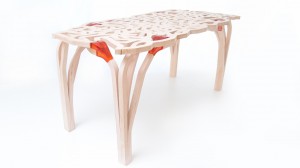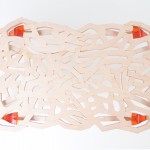The Future of 3D Printing (and Elliot)
 I don’t know if 3D printing will change the world, but I do know that it’s helping Elliot start up a new business in Berlin.
I don’t know if 3D printing will change the world, but I do know that it’s helping Elliot start up a new business in Berlin.
Elliot’s a good designer. He’s designed everything from 3D videos to websites to room dividers to packaging. But he has a special knack for furniture – especially furniture designed on a computer.
Using 3D software Elliot designed the table in the photos. He then built one, using a numerical controls (NC) laser to cut the wood and a 3D printer to create the red resin joints. (You can get them in any color you want).
The design incorporates both additive and subtractive manufacturing. Elliot creates the tabletop by cutting wood away – it’s subtractive. He creates the joints in a 3D printer by adding one layer of resin on top of another repetitively.
Elliot has now rented a studio in Berlin and is starting up a furniture design and manufacturing business, under the brand name Studio Elliot White. None of this would have been possible without 3D design software and printers.
So, is Elliot a harbinger of things to come? Well, maybe. A few days ago the New York Times had a lively discussion on the topic in  its Room For Debate section. Here are some highlights along with my ruminations.
its Room For Debate section. Here are some highlights along with my ruminations.
Big picture – the grand vision has been that we will all have 3D printers in our homes. We could order Elliot’s table (or bench or chair) and he would simply send us the design files for us to print at home. That seems unlikely, at least in the near term. Home printers just don’t produce the necessary quality.
Future schlock – Amazon recently opened its 3D printing store. You can create your own products. Unfortunately, most of it is schlock – like a 3D printed plastic dog bone. Even with such simple products, you don’t get to print it yourself. Amazon prints it and ships it to you.
Jet engine parts – some analysts suggest that 3D printing will always be low quality because of inherent weaknesses in additive technology. But General Electric has figured out how to print fuel nozzles for jet engines by printing layers of metal. By doing so, they reduce costs and lead times while improving quality.
 Clothes – I wouldn’t have thought of printing clothes but start-up companies are pushing the trend. Indeed, the US Army seems to think that it can clothe soldiers in high-tech printed uniforms for greater comfort and safety. And, yes, there is even a range of 3D printed bikinis.
Clothes – I wouldn’t have thought of printing clothes but start-up companies are pushing the trend. Indeed, the US Army seems to think that it can clothe soldiers in high-tech printed uniforms for greater comfort and safety. And, yes, there is even a range of 3D printed bikinis.
Food – yes, it’s possible to print food. I was heartened to learn that one of the first applications is to print chocolate onto other foods.
Guns – yep, printable guns are here. And here. They’re cheap and undetectable. But don’t worry. They can only fire a few bullets before they break.
Manufacturing – could 3D printing return manufacturing to advanced countries? Maybe. As one Room For Debate writer noted, manufacturing productivity has risen much more quickly than overall business productivity. Meanwhile, the cost of labor in China is rising at 10 to 15% per year. If these trends continue, on-shoring makes a lot more sense.
So, what’s the future? Well, once again, I think we’re caught in the hype cycle. The initial hype was intense. Now there’s a bit of disappointment as reality seeps in. But that’s usually followed by a rising productivity curve as entrepreneurs sort out which technologies fit which markets. I’m generally optimistic. Now … does anyone want to buy a table?